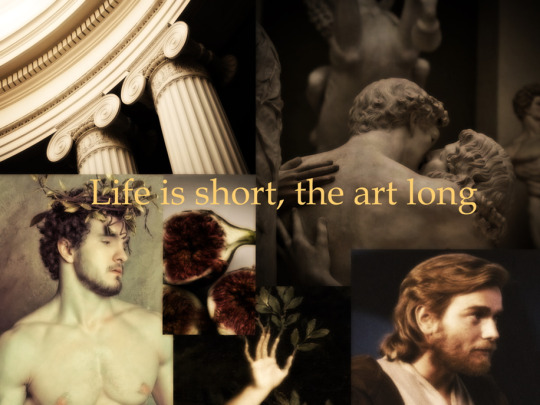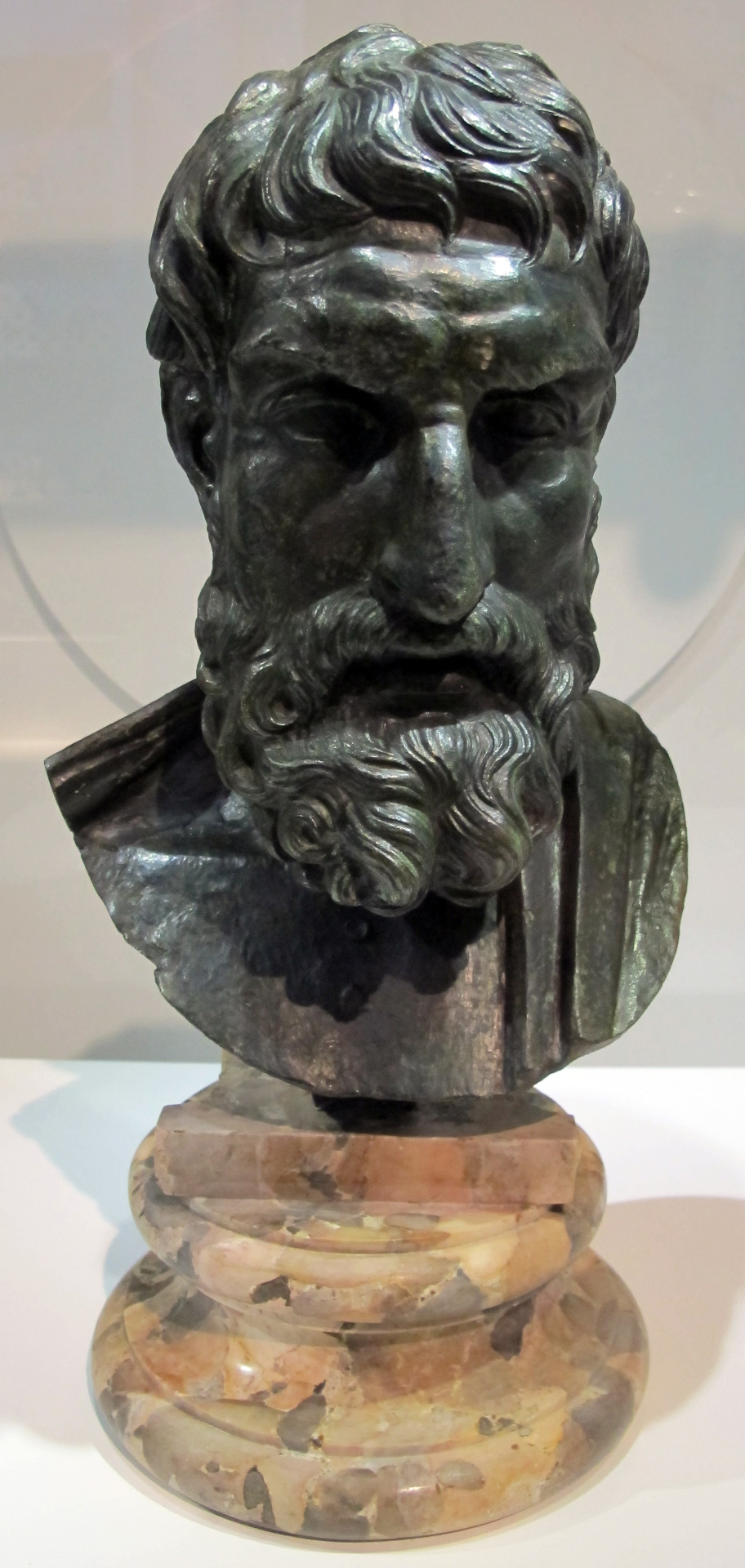#Epicureanism
Text
“Las desgracias deben ser curadas por un sentido de gratitud por las cosas buenas que nos han sucedido, y el conocimiento de que lo que ha pasado no se puede deshacer”
Epicuro de Samos

El Epicureísmo es un movimiento filosófico fundado alrededor del año 307 a. de C. basadas en las enseñanzas del antiguo filósofo griego Epicuro de Samos, el cual fundó la escuela llamada "Jardín" y cuyas ideas fueron seguidas por algunos otros filósofos llamados “epicúreos”.
Se trata de un periodo que abarca la cultura griega a través del mediterráneo y cerca del mundo oriental, derivado de las conquistas militares de Alejandro Magno.
Epicuro llegó a Atenas 17 años después de la muerte de Aristóteles, No obstante que pocos escritos de Epicuro de Samos se tienen hasta nuestros días, Por lo que solamente sobreviven algunos testimonios de su filosofía a partir de sus seguidores, entre los cuales destacan el filósofo y poeta Lucrecio y el hombre de estado y orador Cicero.
Epicuro fue un atomista, seguidor de los pasos de Demócrito, quien fuera maestro de Pitágoras.
Epicuro sin ser un hedonista propiamente, creía que el mayor bien consistía en buscar un placer modesto y sostenible en forma de un estado de “ataraxia” o de tranquilidad y libertad de miedo, y de “aponia” o ausencia de dolor corporal. Todo lo anterior, a través del conocimiento del funcionamiento del mundo y de los deseos limitantes.
Es por lo anterior que los epicúreos en general se retiraban de la política por considerarla fuente de frustraciones que se contraponía a su defensa de una vida simple y en búsqueda de una paz mental y de virtudes.
A diferencia de otras escuelas filosóficass de la época, cuyos miembros se reunían en lugares públicos, los epicúreos eran mas bien solitarios, y se veían a si mismos como una comunidad de amigos que viven juntos según principios comunes.
Para Epicuro y para sus seguidores, el estudio de la naturaleza era el núcleo de su filosofía, y difería de Platón, quien consideraba que lo verdaderamente real era puramente la forma inteligible y lo natural su imagen.
La práctica epicúrea enfatizaba la memorización y repetición de doctrinas en forma condensada, y es por eso que le sobreviven muchas máximas de los textos sobrevivientes.
Fuentes Wikipedia y Ancient Philosophy: Aristoteles and his successors (Coursera).
#citas de reflexion#notasfilosoficas#frases de reflexion#filosofos#notas de vida#grecia#epicureanism#epicuro
38 notes
·
View notes
Text
Current reading is Julia E. Annas' excellent Hellenistic Philosophy of Mind, a relatively short but densely packed look at how the Stoics and Epicureans conceived of thoughts, actions, and emotions. Annas does a fine job of laying out the strengths and weaknesses of ancient theories of mind--e.g. the Stoics' emphasis on language as the vehicle of thought, which allowed them to develop a sophisticated theory of rational action in humans, but also led them to deny that nonhuman animals are capable of decision making. She's also very good on the complex relationship that Hellenistic philosophy had to science and medicine: major thinkers of the day sometimes reworked their theories to accommodate the latest scientific discoveries, but at other times spurned innovation in favor of appeals to "common sense". Overall, it's a solid introduction to a complex and intriguing subject.
#personal#current reading#tagamemnon#ancient philosophy#Hellenistic period#Hellenistic philosophy#Stoicism#Epicureanism
36 notes
·
View notes
Text
"Do not spoil what you have by desiring what you have not ; but remember what you have now was once among the things only hoped for."
Epicuro
24 notes
·
View notes
Text

“Who is this God person anyway?”
The Hitchhikers Guide to the Galaxy, not only is it a wholly remarkable book, it is also a highly successful one – more popular than the Celestial Home Care Omnibus, better selling than Fifty-three More Things to do in Zero Gravity, and more controversial than Oolon Colluphid's trilogy of philosophical blockbusters Where God Went Wrong, Some More of God's Greatest Mistakes and Who is this God Person Anyway?
#humour#quote#hhgttg#oolon colluphid#epicureanism#epicurean paradox#evil#god#who is this god person anyway
62 notes
·
View notes
Text
Listen, I know Freud did Oedipus dirty by naming all things Oedipal after him but not even 10% as dirty as the Catholic church did my best boy Epicurus by making sure his name is associated with luxury, consumption of delicacies, and snobbery when he actually preached the pursuit of pleasure via slow-paced, communal, anti-consumerist living and wrote reams about the corruptive influence of money.
26 notes
·
View notes
Text

“Certain ancient Romans had the words [Non Fui, Fui, Non Sum, Non Curo] inscribed on their funeral monuments (above is one example, using slightly different wording). They may be translated as: ‘I was not; I was; I am not; I care not.’”
#death#momento mori#inscription#headstone#funeral monument#monument#grave#epitaph#tombstone#gravestone#non curo#philosophy#mortality#afterlife#epicureanism#epicurus
5 notes
·
View notes
Text
Ars longa, vita brevis
It's Obikin AU time!

Obikin AU, in which Senator Obi-Wan Kenobi, elected representative of Stewjon, attends the annual Coruscantian celebration. As a man of morals, austere towards himself and true to his own word, this reimaging of the Cult of Dionysus, a festival of open sensuality, gluttony and decadence during the on raging Clone War is against his morals. The upper class of the inner Rim enjoys themselves, polygamy, wine, and women while other people in Galaxy suffer. He wants to end it and not be part of it. But sent as political representative, and more so pressured by his consultants, he attends the salon.
There, he is overwhelmed by the scent of his future lover, losing himself in a haze of drunkenness and love.
~*~
(Here a tiny scene to describe his first impressions, worldbuilding inspired by the Stoa and the Hellenistic time period and some Epicure as a template for hedonism)
Senator Obi-Wan Kenobi loathed festivals of all sorts, often just celebrated to imitate something else or to grant people the chance to lose themselves in drugs, intercourse, and gluttony. The senate, novelty, business elites, and every man who carried fortune and a mighty name were invited. The event had become a networking opportunity to mingle with the upper class of the Inner Rim, originally designed to fund a political campaign for pacifism, how ironic during a war, but whatever was left of this goal, was nowhere to be found.
The Entrée was an open square leading to a columned hall, imitating the stoa poikile of Athens. Although the carnal pleasure of life as they were celebrated there, spoke more to hedonism than stoicism. Stoa poikile had become a name with a scornful undertone.
It was a feast of desires, paid love available with one beckon of the hand or a wink, lightly dressed Twi leks sitting on people’s laps. No manners as they were promised by their highborn status were holding the guests back to enjoy themselves, coitus, and Kaiburr crystal drinks.
“Tedious.”, Obi-Wan scoffed, scrunching his nose, rubbing over his temples, cautious to not come in touch with the artwork that was placed on his head. Expensive for no reason and only worn to show off. His entire attire was selected by his consultants.
His curls had been elaborately shaped with gel; the rest had been sprinkled with copper powder to emphasize the reddish color of his hair. The whole thing was crowned by a laurel wreath that stood on his head, symbolizing him as some victor. Otherwise, his clothes were kept simple, a beige robe tailored in the style of the ancient Greeks and leather sandals. His advisors had made him look like a Greek demigod, the light fabric playing around his upper arms and exposing a piece of skin from his chest and right shoulder.
He leaned against one of the pillars, took a sip from his drink, and tried to let the intoxication of the feast sink in, to forget the raging moral priest in his mind. The whole decadence of the upper class spread out before him, carved in marble like an ancient fresco. But instead of depicting warhorses, foot soldiers, and sharpened spears, a feast of Dionysus, reimagined, blossomed on the steps of the columned hall.
Freshly picked figs had been set up in woven wicker baskets, sweet pastries dripping with syrup in colorful ceramic bowls and bread dipped in wine on decorated plates. Each piece of pottery was a work of art for itself, crafted by the most skilled hands of all Coruscant and yet it was treated like dirt here. The guests wolfed down the delicacies and stuffed their mouths and stomachs. Then they turned to the scantily clad figures on their laps, young men or women, youths who had just reached manhood, kissed their exposed skin, tore the silk and linen from their thin shoulders, and devoured what they were after from the beginning.
No sexuality, no desire, no preference was tabooed here if you paid the respectable credits for it. A green Twi’lek, jewelry dangling from her two lekkus, had risen from another man’s lap and eyed Obi-Wan from afar. Her eyes roamed his stature, his bared chest, his freckled skin, before signaling him to come closer. He gently rejected her with a shake of his head, taking another sip from his drink. It was sweet, pink-colored, tasting of strawberries, not to his taste, he grimaced and still drowned it.
~*~
(And here a little snippet of Senator Obi-Wan meeting Anakin and then being ‘fuck it, I mean fuck me’ abandoning all his morals to just get a taste of the other man.)
Drums were played somewhere and the people had started to dance with joined hands, forming circles, barefoot on the cool marble, moving their bodies in sensual rhythms, intoxicated by the drum sound. They blurred into a havoc of colorful clothing in front of Obi-Wan’s eyes, fabric, silk, damask, linen blown by the heated summer wind and folding around their sculpted body, each move performed with the intention to desire and be desired.
The air tasted of cinnamon, spiced leather, mixed with the musk of human sweat, intoxicating Obi-Wan, guiding him into a haze of scents and tastes, the land of carnal oral pleasure. His tongue felt heavy in his mouth, velvet-like, fluttery, almost like an erogenous zone being pierced by all the scents and tastes. A shiver ran down his spine, goose bumps adorning his skin.
Someone was approaching him, he realized as a figure detached from the crowd to appear in front of Obi-Wan. The person’s face was hidden behind a pale blue face veil and only the shadows painted on his countenance let Obi-Wan perceive hints of his looks. A sharp bone structure with a piercing jaw, thin cheeks, and a strong nose contrasted by the shadow of long, feminine eyelashes and plush lips. Obi-Wan could only detect the hint of curls, framing the strangers face. He raised his hands, cupping the other man’s face, feeling the other man’s warmth radiating from his skin through the veil.
Obi-Wan opened his mouth, took in a breath, only to be greeted with another wave of the intoxicating scent, that had made him drunken before, losing himself in it. His eyes fluttered shut. New nuances bloomed on his tongue, that he had not been able to decipher before. Next to spiced leather was a mild note vanilla. A slight, fresh note mint, overlapped by the dominate cinnamon. And a sweet-lingering scent of Indian date, that was nearly lost in his musk. It tasted like a melody, perfectly combined shades to complete a great symphony. Pleasure was building in Obi-Wan’s gut, making his blood sing, hum, scream with his desire.
His fingers wandered under the veil to continue with their exploration, unveiling the other man, to finally see the object of his lust. Because he had to ensure to get a taste of it.
~*~
(And a very brief scene of the two lovers, finally holding each other because I have a soft spot for them.)
The starry sky shone above them as the other man laid in his arms on the meadow, crickets chirping in the background and the air still tasting of last summer, tiny blooms flourishing next to the couple. Sleep had stolen Anakin away from him, guiding him into the realm of dreams. He smiled softly at his lover and traced the scar on his face with his thumb, caressing him tenderly, placing his mouth were once his finger had been with butterfly kisses, hoping to preserve this for an eternity.
(Hope you enjoy it!)
#obikin#sw thoughts#sw au#obikin fic#star wars fic#obi wan x anakin#obi wan kenobi#star wars in a greek context#star wars inspired by classic philosophy#seriously that's what I did#studying for exams and then using it as my inspo#star wars thoughts#felix's weird thoughts and drabbles#author's take on poetic language#anakinsstuff#idk what to tag help#hedonism#epicureanism#stoicism#in a fic/ how funky#star wars#homoerotism#ok maybe even a bit more#the senator Obi-Wan Au#felix's Senator Obi-Wan obsession#senator Au
21 notes
·
View notes
Text
The Philosophy of Pleasure
The philosophy of pleasure explores the nature, value, and significance of pleasure as a fundamental aspect of human experience and well-being. Pleasure is commonly understood as a positive sensation or feeling that brings enjoyment, satisfaction, or happiness. Philosophers have approached the study of pleasure from various perspectives, including ethics, aesthetics, psychology, and metaphysics.
Key aspects of the philosophy of pleasure include:
Definition and Nature: Philosophers seek to define pleasure and understand its underlying nature. Pleasure is often distinguished from pain and regarded as a subjective experience that can arise from sensory stimuli, intellectual pursuits, social interactions, or aesthetic experiences. Philosophers also explore different types of pleasure, such as physical pleasure, intellectual pleasure, and emotional pleasure.
Ethical Perspectives: Pleasure plays a central role in ethical theories that aim to promote human well-being and happiness. Ethical hedonism, for example, holds that pleasure is the ultimate good and the primary goal of human life. Philosophers debate the ethical implications of pursuing pleasure, considering whether pleasure should be prioritized over other values, such as virtue, duty, or the welfare of others.
Aesthetic Pleasure: Aesthetic pleasure refers to the enjoyment and appreciation of beauty, art, and sensory experiences. Philosophers of aesthetics examine the nature of aesthetic pleasure, its relationship to subjective taste and cultural norms, and its role in shaping our perceptions of art and the world. They explore questions about the criteria for aesthetic value, the distinction between genuine and superficial pleasures, and the universality of aesthetic judgments.
Psychological and Hedonic Well-being: Pleasure is closely linked to psychological well-being and hedonic happiness. Philosophers and psychologists study the factors that contribute to human happiness and subjective well-being, including the pursuit of pleasure, the satisfaction of desires, and the fulfillment of psychological needs. They examine the role of pleasure in promoting overall life satisfaction and psychological flourishing.
Epicurean and Stoic Perspectives: Ancient philosophical traditions such as Epicureanism and Stoicism offer contrasting views on pleasure and its relationship to virtue and happiness. Epicureanism emphasizes the pursuit of simple pleasures and the avoidance of pain as the key to a happy life, while Stoicism advocates for the cultivation of inner virtue and resilience in the face of external circumstances. Philosophers explore the strengths and limitations of these philosophical approaches to pleasure and well-being.
Critiques and Challenges: Despite its positive associations, pleasure also raises philosophical questions and challenges. Philosophers examine the potential drawbacks of hedonism, such as the risk of hedonic adaptation, addiction, or the pursuit of short-term gratification at the expense of long-term well-being. They also consider ethical concerns related to the pursuit of pleasure, such as its potential to conflict with moral duties or harm others.
Overall, the philosophy of pleasure provides a framework for understanding the nature, value, and ethical implications of pleasure in human life. By critically examining our experiences of pleasure and its role in shaping our values and actions, philosophers seek to illuminate the complexities of human happiness and well-being.
#philosophy#epistemology#knowledge#learning#chatgpt#education#ontology#metaphysics#psychology#ethics#Pleasure#Aesthetics#Happiness#Hedonism#Epicureanism#Stoicism#Psychological Well-being#Subjective Experience#Virtue
2 notes
·
View notes
Text

#epicurus#epicureanism#hedonism#utilitarianism#philosophy#philosophy memes#consequentialism#psychology#psychology memes#stoicism#marcus aurelius
50 notes
·
View notes
Text
This is one for everyone interested in ancient history and Epicurean philosophy. I just learned about this myself today.
Nat Friedman of the Vesuvius Challenge announced that they had just awarded their grand prize for the digital unrolling of a Herculaneum papyrus, which is a HUGE deal in ancient history academics.
Background: nearly all of our classical texts - Greek and Roman literature - comes to us via preservation in the Middle Ages. It is a 'closed corpus' - finds of new texts are extremely rare. The last really historically significant one was Aristotle's Athenaion Politeia in 1891.
Herculaneum was a smallish Roman resort town near Pompeii on the Bay of Naples which was covered with volcanic ash in 79 AD when Vesuvius erupted (like Pompeii). Among the wealthy resort villas of Herculaneum was the Villa of the Papyri, a villa with a large private library focused mostly on philosophy. Some 1,800 scrolls there were carbonized but preserved by the inflow of volcanic ash and have been recovered (intact to wildly varying degrees).
The problem is, of course, the scrolls are both 1) still rolled up and 2) reduced to lumps of carbon, so how on earth do you read them? And that's what the Vesuvius Challenge was focused on: scanning the scrolls using a particle accelerator and then taking that data and digitally unrolling them to produce a readable text. We got our first few words last year, and this year already our first large chunk of text.
It now seems almost certain that over the years to come, we're going to get a steady flow of new fragments and texts out of these, the first large-scale infusion of new texts into the classical corpus since the Renaissance. There are 1,800 of these papyri, 340 are basically complete and another 900 have readable fragments.
Now a few papyri were physically unrolled and partially read earlier (we've had these things since the 1850s) and they were philosophical texts, mostly Epicurean and the first new block of text seems to confirm that the current scroll is ... more Epicurean philosophy. So we're probably in for a LOT of Epicurean philosophy, but even if all we get are philosophical authors the potential texts are incredible: more of Aristotle's Constitutions, missing Plato, and so on.
3 notes
·
View notes
Text
#epicurus#epicurean#epicureanism#philosophy#ancient greek philosophy#pleasure#happiness#the good life
2 notes
·
View notes
Text
“Acostúmbrate a creer que la muerte no es nada para nosotros […] porque todo lo bueno y lo malo consiste en experiencia sensorial, y la muerte es la privación de todas las experiencias sensoriales”
Epicuro de Samos

Filósofo griego nacido en Atenas en el 341 a.C. fundador de la escuela que lleva su nombre (epicureismo) que defendió una doctrina basada en la búsqueda del placer la cual debería ser dirigida por la prudencia.
Criticaba tanto el desenfreno como la renuncia a los placeres de la carne, y argüía que debería buscarse un término medio y que los goces carnales deberían satisfacerse, siempre y cuando no conllevaran un dolor en el futuro. La fillosofía epicúrea afirma que la filosofía debe ser un instrumento al servicio de la vida de los hombres, y que el conocimiento por sí mismo no tiene ninguna utilidad si no se emplea en la búsqueda de la felicidad.
En el año 306 a.C. a la edad de 35 años, fundó su escuela de filosofia denominada el jardín. En donde se tenían charlas convivencias y celebraciones en una casa y un pequeño terreno situado a las afueras de Atenas. Eran admitidas personas de toda condición y clase, por lo que llegó a ser motivo de escándalo ya que combinaba personas respetables y gentes e la vida disoluta.
Mientras para Patón y Aristóteles la filosofia es una búsqueda continua de la verdad, para Epicuro la filosofía es el arte practico de la vida que tiene como finalidad la curación del alma humana.
Su filosofia consta de tres partes; la canónica que se ocupa de los criterios por los cuales llegamos a distinguir lo verdadero de lo falso, la Física que estudia la naturaleza y la Etica que subordina a la canónica y a la física.
Aunque la mayor parte de su obra se ha perdido, se conocen bien sus enseñanzas gracias a la obra del poeta latino Lucrecio, así como por unas cartas y fragmentos rescatados.
Muere a la edad de 71 años dejando mas de 300 manuscritos, incluyendo 37 tratados sobre física y numerosas obras sobre el amor, la justicia y otros temas.
Fuente Wikipedia
#notasfilosoficas#frases de reflexion#filosofo#filosofía#citas de la vida#filosofos#frases celebres#grecia#antigua grecia#epicuro#epicureanism
37 notes
·
View notes
Text
A Hymn to Epicurus
Lucretius, De Rerum Natura 3.1-13
You who first were able, out of such great darkness,
To lift a light so bright, illuminating life’s good things,
You it is I follow, o glory of the Greek people,
And in the marks you’ve pressed I now place the fashioned
Traces of my feet – not so much desirous
Of vying with you, no, but rather out of love
That I desire to imitate you; for how could a swallow compete
With swans, or what could kids, with their shaky joints,
Be able to do in a race like a horse’s mighty power?
You, father, are the discoverer of things,
You supply to us our ancestral precepts; from
Your writings, famous one, as bees in flowering glades
Taste of all things, in like fashion we ourselves devour
All your golden sayings – golden, ever worthiest
Of life that never ends.
E tenebris tantis tam clarum extollere lumen
qui primus potuisti inlustrans commoda vitae,
te sequor, o Graiae gentis decus, inque tuis nunc
ficta pedum pono pressis vestigia signis,
non ita certandi cupidus quam propter amorem
quod te imitari aveo; quid enim contendat hirundo
cycnis, aut quid nam tremulis facere artubus haedi
consimile in cursu possint et fortis equi vis?
tu, pater, es rerum inventor, tu patria nobis
suppeditas praecepta, tuisque ex, inclute, chartis,
floriferis ut apes in saltibus omnia libant,
omnia nos itidem depascimur aurea dicta,
aurea, perpetua semper dignissima vita.

Bust of Epicurus of Samos (342-270 BCE), founder of the Epicurean school of philosophy (the Garden), from the Villa of the Papyri at Herculaneum. Roman copy after a third century BCE Greek original. Now in the collection of the National Archaeological Museum, Naples. Photo credit: Sailko/Wikimedia Commons.
#classics#tagamemnon#Latin#Latin language#lingua latina#translation#Latin translation#Ancient Rome#Roman Republic#Lucretius#Titus Lucretius Carus#ancient philosophy#Hellenistic philosophy#Epicurus#Epicureanism#De Rerum Natura#didactic poetry#dactylic hexameter#hymn
72 notes
·
View notes
Text
Skeleton Amongst theRose's, 1913.

"One thing is certain, that Life flies; One thing is certain, and the rest is Lies"
E.J Sullivan's 1913 illustration of verse 24 from The Rubaiyat of Omar Khayyam.
The Persian Omar Khayyam lived 1048-1131, and was a famed astronomer and scientist. These verses are only historically connected him. The first reference to him as a writer is found 60 years after his death. They may present more of an agnostic Epicurean philosophy than any Muslim tradition, and might have only have been preserved for a millennium by being attached to such a well regarded figure.
In 1859 a pivitol English translation was published that would result in this books fame throughout late Vistorian and early 20th century intellectual circles. This illustration is from a 1913 edition.
In the psychedelic art poster movement of the 1960's, a copy of the image was made famous again. It was vividly colorized for the band The Grateful Dead, who continue to use it as an iconic picture 60 years later.
4 notes
·
View notes
Text
I am not "divorcing Virtue for Pleasure's sake", we are all in a polycule actually.
41 notes
·
View notes
Text
Based centricide oc?! 🤯

27 notes
·
View notes